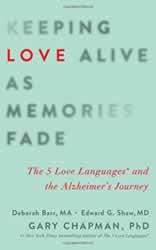Gracie and Ken were married very young, at 20 and 21. “We always had a great marriage,” says Gracie. “Always had a great intimate relationship, touching, hugging, watching TV and holding hands.”
They had two children. Over the years they bought ten old homes and lived in each while they remodeled it together, then “flipped it” for a profit and moved to the next one. Then, in the midst of so much happiness, inexplicably, Ken began to pull away from Gracie.
She pleaded with him. “What is happening? I don’t understand it.”
He told her, “In 1974, you said something to my mother that was very unkind and I have decided I am going to punish you for that. I’m not going to forgive you.
Gracie said, “Ken, that makes no sense. Your mom and I are best friends.”
Weeks later, things were no better. Mystified, Grace remembers saying, “Ken, what is wrong?” He responded, “Well, I remember one time you said I was only interested in you for sex, so I have decided I will never touch you again.”
The gulf between them continued to widen, no matter how Gracie tried to repair the breach. Ken, said Gracie, was “argumentative, argumentative, argumentative.” She said, “He got fired from three jobs because he challenged his boss.” For more than a decade, she struggled to understand what had happened to the satisfying marriage they once had.
“About three years ago I finally said, ‘We’re going to the doctor. We’ve going to prove, one way or the other, that one of us has an issue.’” Ken told her, “I’ll go because I’m going to prove it’s you.”
A PET scan, which was read by two experts, gave Gracie the clinical diagnosis of frontotemporal dementia. Gracie had never heard of this and started researching FTD.
For more than a decade, Gracie had had no explanation for the radical changes in Ken’s behavior. Learning his diagnosis finally gave Gracie the why she so earnestly sought. Unfortunately, understanding the illness did not improve their marriage or take away her gnawing loneliness. Since the day 12 years ago when Ken told her, “I will never touch you again,” he has remained physically and emotionally isolated from her.
Understanding her husband’s illness did not improve their marriage or take away her gnawing loneliness.
“I am married, but I live alone,” said Gracie. “I do not have a life partner. He’s really not interested in my job. We don’t talk about the future. We don’t talk about anything.”
After so many years of emotional and physical estrangement from her husband, Gracie’s emotional love tank was nearly bone dry. “Before I knew the diagnosis,” she admitted, “I felt anger and hate toward Ken. Since the diagnosis, I still feel some anger. I still want to blame him, even though I know I can’t. I want him to be accountable for some stuff, knowing he can’t be accountable.”
The Experiment
In The 5 Love Languages, author Dr. Gary Chapman recounts the story of a woman named Ann, who felt much the same as Gracie. Her emotional tank was empty and her marriage to her husband, Glenn, was painful. Others had told her the same thing Gracie had been told: It’s hopeless; leave him. Ann’s response was the same as Gracie’s: “I just can’t bring myself to do that.”
Feeling trapped between a rock and a hard place, Ann said, “Dr. Chapman, I just don’t know if I can ever again love my husband after all he’s done to me.”
Chapman told her, “I want to read something Jesus once said I think has some application to your marriage.” He slowly and deliberately read thee words: “But to you who are listening, I say: Love your enemies, do good to those who hate you, bless those who curse you, pray for those who mistreat you. . . . Do to others as you would have them do to you . . . “
“Ann, does that sound like your husband? Has he treated you as an enemy rather than as a friend?
Ann paused and said quietly, “Yes.”
“Has he ever cursed you?” Chapman asked.
“Many times.”
“Has he ever mistreated you?”
“Often.”
“Ann, if you’re willing, I would like to do an experiment. I would like to see what would happen if we apply this principle to your marriage. Certainly we do not have warm feelings for people who hate us. That would be abnormal, but we can do loving acts for them. That is simply a choice. We hope that such loving acts will have a positive effect upon their attitudes and behavior and treatment, but at least we have chosen to do something positive for them.”
Though it was extremely difficult, Ann began to reach out consistently to Glenn. Over the next six months, she saw a tremendous change in Glenn’s attitude and treatment of her. Amazingly, the marriage was repaired.
The parallels between Ann’s situation, as detailed in The 5 Love Languages, and Gracie’s situation, are obvious. The difference, however, is stark: Ann’s husband was cognitively normal; Gracie’s husband has a type of dementia that creates emotional indifference and impairs both empathy and insight. Give this, could Ann’s experiment possibly succeed for Gracie too?
Gracie recalls, “I went into it with a negative attitude, expecting nothing, or very little if he did happen to respond. I was playing the role of the ‘victim,’ which is easy to do with this disease.”
Nonetheless, Gracie began to deliberately show love to Ken. She served hi meals, snuggled up to him in bed, and spoke affirming words to him. All of these kindnesses were met with indifference or resistance. She kept a journal, noting everything she did, how she felt about it, and how Ken reacted.
Within a few days, there was a change—but not with Ken.
“This is where it gets really amazing,” she says. “After the first couple of days, I would reread the previous journal entries stating all my acts of service, from making his morning coffee to taking a late-night snack to his ‘man cave’ before I went to bed. I began to realize, This is what God does for me every single day and I am not required to acknowledge his gifts. He gives gifts just because he loves me. That’s all: He loves me.
“I realized I had been making my love conditional; if Ken responded, then I would do acts of service for him again; if he did not, then I pulled away. I began to get so excited about showing Ken unconditional love, and he is not required to acknowledge one thing. I began to do these kindnesses for my pleasure and to honor God. I started to have fun with it.
“Now, I look for things in the grocery store I know he will like, special cookies or candies. Every day I offer to take him anywhere he needs to go. I speak kind words to him often, and most of the time he does not respond and just leaves the room. But this ‘experiment’ is no longer about seeing if Ken will express love back to me. It has become about what can I do for him that honors him, and therefore honors God. I am still devastated that he has this terrible disease, but I understand more each day the vows of ‘till death do us part.’
Although Gracie’s experiment is now finished, she does not plan to stop speaking Ken’s love language even if he makes no response.
Gracie says to others in a similar situation, “What have you got to lose? I would encourage others to do this, first learning your loved one’s love language and then responding with that daily. I believe we as care partners have the ability to do more for our loved ones than any doctor, medicine, or counseling. We have the ability to try to reach them in a way that science knows little about—speaking to their love language. Although it may be harder than others, I promise it will be a success, either for the patient, the care partner, or hopefully both, and in ways you probably never imagined.”
Taken from Keeping Love Alive as Memories Fade: The 5 Love Languages® and the Alzheimer’s Journey by Deborah Barr, Edward G. Shaw, and Gary Chapman (©2016 by Marriage and Family Life Consultants, Inc., Deborah Barr, and Edward G. Shaw), Moody Publishers. Used by permission. www.moodypublishers.com.













